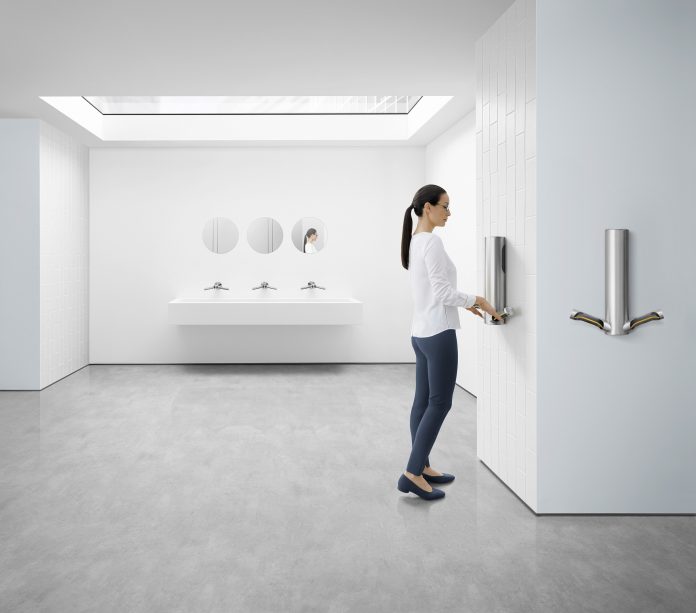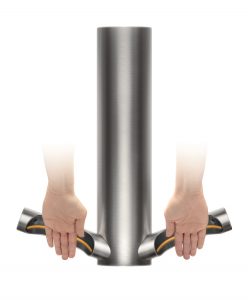
Media Release
Dyson has launched the Dyson Airblade 9kJ hand dryer, the fastest, most energy efficient HEPA-filtered hand dryer.
With a completely unique design and cutting-edge technology, the Dyson Airblade 9kJ hand dryer enables people to dry their hands quickly and hygienically, while using low energy and offering an alternative to single-use paper towels.
“At Dyson we believe hand drying should be fast, hygienic and responsible in its energy use. We solved many of these problems when we disrupted the industry with the launch of the first Dyson Airblade™ in 2006,” explains Jake Dyson, Chief Engineer. “We continue to pioneer with the Dyson Airblade 9kJ – our latest hand drying technology. From the acoustics to its design, everything has been rethought to deliver the best performance without any compromise on user experience or hygiene.”

The Dyson Airblade 9kJ hand dryer machine has been over three years in development, with more than 700 prototypes made. The result is the quietest Dyson Airblade™ hand dryer yet , with fast hand drying in 10 seconds . Our motor and airflow technology allow the new Dyson Airblade 9kJ hand dryer to use up to 87% less energy than warm air dryers in Eco mode, while producing up to 85% less carbon dioxide emissions per dry than paper towels.
“It is the instinct of engineers to want to improve things, make them more efficient and to use fewer resources in the process. It is wired into our DNA and it is this urge which drives progress and advancement – even in the washroom,” explains James Dyson. “In 1907, paper towels were first introduced and the electric hand dryer made its first appearance in 1948 – but both have their failings. The journey to find a better way is fascinating. In 2006 the invention of Dyson Airblade™ technology meant that, for the first time, water was scraped off hands using high velocity unheated air, thus reducing the energy consumption,” he adds.
As always with Dyson, success is in the detail and the intelligent combination of hardware and software. The Dyson Airblade 9kJ hand dryer’s robust design and stainless steel body is built to last and rigorously tested to withstand real-life washroom conditions. It also employs pioneering Dyson technology including:
A Curved Blade™ design
Powered by the Dyson digital motor V4, which spins at up to 75 000rpm , sheets of air flow up to 624m/h5 through two 0.45mm curved apertures that follow the contours of your hands, removing water in less time. Our powerful Dyson digital motor V4 shifts 23 litres of air per second5, allowing the Dyson Airblade 9kJ hand dryer to dry your hands fast, in 10 seconds3.
The Dyson Airblade 9kJ hand dryer uses 9.1 kilojoules of energy per dry, meaning it costs just $19 a year to run in Eco mode.
Touch-free operation
The machine uses ‘Time of flight’ sensors that accurately detect hands to activate air.
A hygienic HEPA filtration
With a fleece-lined glass fiber HEPA filter, which captures 99.95% of particles, including bacteria and viruses, from the washroom air, the machine uses clean air to dry hands.
Acoustic engineering
Our quietest Dyson Airblade™ hand dryer yet2, the Dyson Airblade 9kJ hand dryer features silencers made from open-cell foam and perforated discs, reducing noise as airflow passes through the motor.
To achieve the reduction in noise, Dyson re-designed the airflow paths through the machine, making them more direct and therefore reducing sound output.
The motor housing of the Dyson digital motor V4 regulates airflow paths through the motor, reducing noisy turbulence. The motor is mounted on silicon rubber to further reduce noise, and the specially designed open-cell foam silencers absorb vibrations from air entering and exiting the motor.
The Dyson Airblade 9kJ hand dryer costs AUD $1,590 and is designed to suit any commercial or public washroom, from offices, shopping malls and restaurants, to public spaces, amusement parks, schools, hospitals and hotels.
Image Credit: dyson.com.au
















